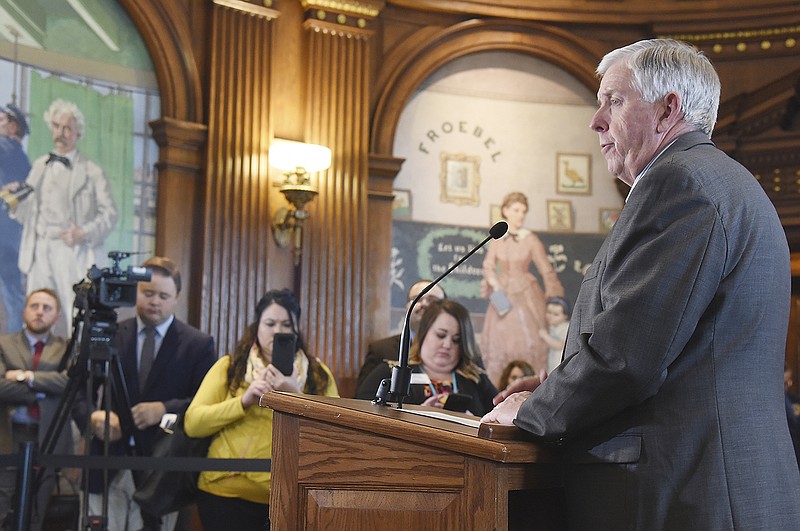Gov. Mike Parson announced Monday the launch of the campaign that seeks to inform youth of the dangers of vaping, which Parson directed state departments to begin building last month, but he and other state leaders did not immediately commit to more direct actions such as lawsuits or bans against electronic cigarette companies or their products.
The state of California filed a lawsuit Monday against the United States' biggest e-cigarette maker, Juul Labs, alleging the company deliberately targeted teenagers with its early marketing campaigns, the Associated Press reported.
Juul faces multiple state and federal investigations into its marketing efforts and whether that marketing sparked a surge in teenage usage of vaping products, according to the AP.
Parson said Monday that it's too early for him to support filing or joining a lawsuit against e-cigarette makers. He deferred to state lawmakers, but also said he expects a decision would need to be made soon.
"We need to get all the facts on the table, and I think that's what we're all trying to rush to do," he said of needing to know more about the additives in vaping products and whether to act legally or politically.
He said hearings would be necessary where experts could speak to research.
"You've got two people out there (who have) died from this. You've got to step your game up a little bit, and I think for us, on the administrative side, we want to be ready to be talking about this in January when the Legislature comes back," Parson said.
As of Nov. 15, there have been 35 cases of vaping-associated lung injuries in Missouri, including two deaths, "with a majority of such cases involving individuals age 15-24," according to a news release from Parson's office.
The Centers for Disease Control and Prevention's most recent update last week on illnesses and deaths associated with vaping reported, as of Nov. 13, there have been 2,172 cases of lung injuries associated with vaping among every state - except Alaska - and the District of Columbia, Puerto Rico and the U.S. Virgin Islands. Forty-two deaths have been confirmed in 24 states and the District of Columbia.
The CDC also reported it has identified vitamin E acetate as a "chemical of concern" among vaping-associated lung injuries, having found the chemical in every lung fluid sample from 29 patients in 10 states.
The chemical may be used as a thickening additive in e-cigarettes that contain THC, and the CDC recommends "people should not use e-cigarette, or vaping, products that contain THC, particularly from informal sources like friends, or family, or in-person or online dealers."
Dr. Randall Williams, director of the Missouri Department of Health and Senior Services, said Monday: "We think it's incredibly dangerous to put vitamin E in vaping products," but he also deferred to legislators on whether the state should ban the additive.
The primary focus of Monday's news conference was to officially launch the "Clean the Air" public awareness campaign to deter youth from vaping.
Two campaign posters were on hand. One poster, in an apparent reference to flavored e-cigarette products, featured a mango and some mango slices and read "Just eat the mango. Don't vape it! Vaping can cause lung damage."
The other poster featured a person's face shrouded by a cloud of e-cigarette vapor and read "Vaping harms your learning, memory and attention. But hey! Good luck on your test!"
Parson signed an executive order in October directing the state's health, K-12 education and public safety departments to develop the campaign, using existing resources and state appropriations.
Williams especially credited the state's Department of Elementary and Secondary Education for providing the platform, mostly on social media, to reach teenagers.
Clear the Air's social media outreach includes "graphics and a series of videos specifically targeting Missouri's youth" on YouTube, Instagram and Snapchat - all launched Monday on those social media platforms. A website was also created, stopthevapemissouri.org.
Williams said success of the campaign will be defined as every teenager in the state knowing vaping is harmful in the short and long term.
Margie Vandeven, Missouri's commissioner of Elementary and Secondary Education, said the state is working to distribute the campaign's information to public school districts and charter schools - "fact sheets for educators, parents and medical providers are also in production, along with posters for school facilities," according to the news release from Parson's office.
The campaign materials will be available through DESE at no cost to schools, and "cessation and addiction treatment information will be made available in order to arm schools with helpful resources," according to the news release.
Local public and private schools have reported significant increases over recent years in the numbers of tobacco-related violations among students, including vaping.
There's also been work with the Missouri School Boards' Association to develop policies for schools and with the Missouri PTA to educate parents, Vandeven added.
On the law enforcement side, Dottie Taylor, state supervisor of the Department of Public Safety's Division of Alcohol and Tobacco Control, said efforts during the past month have determined 83 percent of Missouri retailers are checking IDs and denying e-cigarette sales to youth younger than 18.
"We believe that continuing our enforcement efforts, along with merchant education and training, as well as continuing to focus on the dangers of vaping, can move the percentage of retailers in compliance closer to 100 percent," Taylor said.

